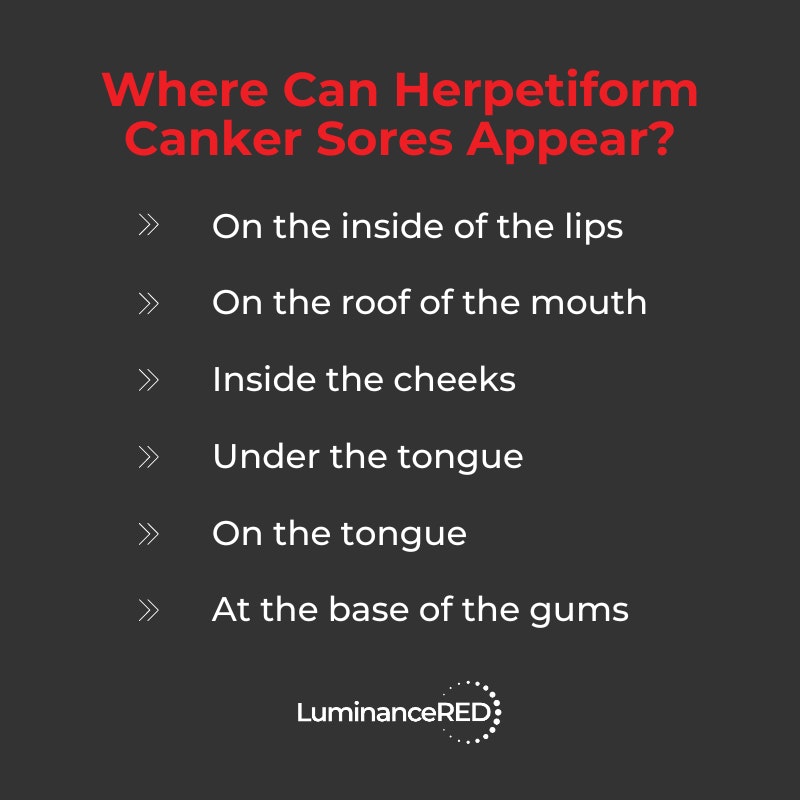Herpetiform Canker Sores: Everything You Need To Know

Canker sores are a pain — literally.
But herpetiform canker sores are particularly unpleasant. These unusual ulcers aren’t common, but when they do occur, they interfere with the simplest tasks, like chewing and smiling.
Here’s everything you need to know about identifying, treating, and preventing herpetiform canker sores.
What Are Canker Sores?
Before we explore herpetiform canker sores, let’s look at canker sores in general and how to identify them.
Canker sores go by many names — aphthous ulcers, mouth sores, cankers — but even though the name isn’t consistent, the symptoms that disrupt your life are pretty straightforward, even in cases of minor canker sores.
Aphthous ulcers are shallow white lesions with inflamed pink borders. Minor cankers measure between one and four millimeters, while a major canker is five millimeters or larger. They may develop on any soft surface inside your mouth, including the insides of your cheek, your tongue, the roof of your mouth, or your gums.
In some cases, a canker sore can pop up in your throat. While a throat sore is painful, it’s probably nothing to worry about.
Raw mouth ulcers can make it challenging to eat, sleep, brush your teeth, speak, and generally function throughout the day.
Canker Sores vs. Cold Sores
Don’t confuse a canker sore with a cold sore, which is a contagious ulcer that forms on the outside of your mouth on or near your lips.
Cold sores are caused by the herpes simplex virus (HSV). The herpes simplex virus type 1, or HSV-1, triggers most cold sores and spreads orally from person to person. Type 2, or HSV-2, typically causes genital herpes, but it is also capable of causing mouth sores.
How to Identify Herpetiform Canker Sores
Herpetiform canker sores are the least common type of aphthous ulcer, occurring in less than 5% of all people who experience cankers. Herpetiform canker sores resemble herpes blisters in appearance, which is where they get their name, but they’re a completely different ailment and not caused by the herpes virus.
Herpetiform canker sores, also called herpetiform aphthous stomatitis, look like tiny, pinpoint blisters that occur in clusters of up to 100. They can develop anywhere on the soft tissues inside your mouth, including:
- The inside of your lips
- The roof of your mouth
- The inside of your cheeks
- Under your tongue
- On your tongue
- The base of your gums
Before this type of mouth ulcer forms, you may feel a tingling or burning sensation where the sore is about to appear. After the herpetiform canker sore emerges, you may also notice the following symptoms:
- Cluster of tiny mouth ulcers that are white or yellow in color
- Irregular edges around the mouth ulcers
- Clusters merge into one large, painful canker
Regular and Complex Canker Sores vs. Herpetiform Canker Sores
Cankers come in several variations, and it can be helpful to know which type you’re dealing with. So, what’s the difference between regular canker sores, complex canker sores, and herpetiform canker sores?
Healing time. One major difference between the types of cankers is how long they take to heal. Regular cankers heal within seven to 10 days. Complex canker sores take much longer to heal. Even with effective therapies, they may cause discomfort for up to six weeks.
While ulcers caused by herpetiform aphthous stomatitis appear alarming, they typically heal within one to two weeks, just like regular cankers. In most cases, you won’t need additional medical attention.
Size. The size of your mouth ulcer can also tell you what type of canker you’re dealing with. As discussed above, regular canker sores measure under four millimeters, and complex canker sores often spread to five millimeters or larger.
Herpetiform canker sores are different. They consist of dozens of tiny, uniformly sized canker sores.
Other symptoms. In general, you won’t experience additional symptoms from regular and herpetiform canker sores. Complex canker sores, however, can cause the following symptoms:
- Fever
- Swollen lymph nodes
- Fatigue and lethargy
This is because complex canker sores are often signs of a more serious underlying condition, which a medical professional can determine. The most likely causes include an autoimmune disease, a vitamin deficiency, or an allergy.

Canker Sores and Ulcerative Colitis
Ulcerative colitis (UC) is an inflammatory bowel disease that often leads to symptoms like rectal bleeding and extreme cramping and pain. In some cases, it may also cause mouth sores and other issues inside your mouth, such as taste changes, bad breath, and dryness.
If you suspect you’re suffering from ulcerative colitis, consult your doctor as soon as possible. This is a serious condition that requires medical treatment.
Common Causes of Herpetiform Canker Sores
There’s no single cause of herpetiform canker sores. Instead, a combination of factors play a role in the development of these mouth ulcers.
Injury in the Mouth
Irritation or injury to your cheeks, gums, or tongue can cause herpetiform canker sores to develop. This is especially true for people with braces or denture appliances that rub against the inside of the mouth.
Other causes of oral injury include:
- Vigorous brushing
- Excessive flossing
- Toothpicks
- Dirty dental appliances
To prevent injury to oral tissues, avoid chewing gum, opt for a soft toothbrush, and clean your dental appliances daily.
Reaction to Oral Care Products
Toothpaste and mouthwash products containing sodium lauryl sulfate (SLS) are especially notorious for irritating the mouth. SLS functions as a “surfactant” that produces the cleansing and foaming action in soaps and toothpastes.
Though the United States Food and Drug Administration (FDA) claims SLS is safe, thousands of studies have associated the ingredient with skin irritation and organ system toxicity.
Acidic Foods
Acidic fruits and vegetables, such as lemons, pineapples, tomatoes, and oranges, may trigger cankers. Some people are more prone to this reaction than others, so pay attention to the condition of your mouth before and after eating acidic foods.
Vitamin Deficiency
Vitamins and minerals such as iron, zinc, folic acid, and vitamins B1, B2, B6, B12, and C are fundamental to your health. Untreated nutrient deficiencies may contribute to canker sore development.
Zinc, for example, is an essential trace element the body needs in small doses each day to properly function. It supports hormone production, immunity, and digestion, and research demonstrates it may be an effective treatment for oral ulcers.
The full range of B vitamins enables many critical bodily functions as well, including healthy cell growth, metabolism, and energy, all of which protect your mouth from herpetiform canker sores.
Severe Stress
Anecdotal evidence indicates canker sores can develop from stress, and that there is a high correlation between mouth sores and anxiety, depression, and psychological stress.
As of this writing, experts don’t understand exactly why this is. One theory is that people experiencing stress may indulge in behaviors that trigger mouth ulcers, such as biting their lips and cheeks or eating acidic foods.
If you want to decrease your chances of developing mouth sores, look for healthy ways to manage your stress levels. Here are a few stress management techniques that could help:
- Practice mindfulness
- Add yoga and meditation to your daily routine
- Incorporate deep breathing throughout your day
- Discuss your stress with a qualified mental health professional
- Schedule time for hobbies, socializing, and volunteer work
If you’re stressed because you have too much on your plate, try delegating tasks to others. There’s no shame in asking your friends, loved ones, partner, or co-workers for help when you need it, especially if it will prevent herpetiform canker sores from forming.

Who Faces the Highest Risk of Developing Herpetiform Canker Sores?
Anybody with a history of cankers has the potential to develop herpetiform canker sores, though these ulcers are rare. Herpetiform cankers develop most often in later life, so mature adults are at higher risk than teens and young adults.
The following factors may also increase your likelihood of developing this type of mouth ulcer:
- Family history of mouth sores
- Use of poorly fitting dentures
- Poor oral hygiene
- Hormonal changes, such as pregnancy, menstruation, or menopause
- Consuming large amounts of spicy foods
Treating Herpetiform Canker Sores and Other Mouth Sores
You treat herpetiform canker sores the same way you’d treat any other mouth sore: by choosing from a variety of over-the-counter products, medications, and natural remedies.
Mouth Rinses
Antimicrobial rinses, such as Listerine, Peridex, and PerioGard, are popular options for people vulnerable to canker sore outbreaks. These antimicrobial rinses fight dental plaque and protect gum tissue from ulcers by reducing the amount of bacteria and microbes in the mouth.
Oral Medication
Though there are no existing pharmaceutical medications to treat cankers, you can ease your discomfort using pain-relievers like ibuprofen, acetaminophen, or naproxen. Acetaminophen (Tylenol) may be the best choice of these, since other pain relievers fall into the category of non-steroidal anti-inflammatory drugs (NSAIDs), which may actually contribute to canker sore development.
Zinc throat lozenges may reduce the symptoms of herpetiform canker sores.
Topical Analgesics
Over-the-counter topical anesthetics like benzocaine (Kank-A®) and Orajel™ safely and temporarily numb painful sores. Apply these local anesthetics a few times per day according to their instructions to relieve discomfort until your herpetiform canker sores heal completely.
Natural Remedies
If you prefer natural remedies over medications, there’s no shortage of options to try:
- When blended with Benadryl® or another antihistamine, milk of magnesia, best known by the brand name Maalox®, alleviates the pain caused by mouth sores. Milk of magnesia is an antacid that coats your canker sore to prevent irritation, while antihistamines soothe inflammation.
- The healing properties of apple cider vinegar help fight infections, making it a popular option for treating canker sores. Dilute it with water using a 1:10 ratio.
- Silver nitrate is a natural chemical that cauterizes cankers. While the process is quite painful at the time, it’s also highly effective in decreasing ongoing pain and expediting healing time.
- According to anecdotal evidence, coconut oil is a great natural solution for treating mouth ulcers. Coconut oil possesses the four A properties — antimicrobial, antiviral, anti-fungal, and anti-inflammatory — among others, so no matter what’s causing your mouth sores, coconut oil is likely to help.
- Swishing a combination of salt and warm water or baking soda and warm water is perhaps the most accessible natural treatment for herpetiform canker sores. These pantry ingredients can work to fight inflammation and pain from mouth ulcers.
- Light therapy is a noninvasive treatment option that reduces pain and promotes healing while preventing new canker sores from forming. Studies have demonstrated the effectiveness of using light therapy to treat recurrent mouth sores.

Herpetiform Canker Sores: Final Thoughts
Light therapy may seem like a surprising treatment option for canker sores, but this treatment has shown incredible promise in treating many ailments since NASA stumbled upon it in the 1990s. Since then, studies have revealed that skin cells can metabolize medically optimized light and convert it into cellular energy, boosting natural processes like healing and alleviating pain quickly.
In fact, clinical data conclusively shows that the application of specific wavelengths of high-powered red light to canker sores reduces the average healing time from 8.9 days to 3.1 days!
If you choose to treat your herpetiform canker sores with light therapy, try the Luminance RED. It’s an FDA-registered light therapy device designed to gently alleviate canker sore pain and accelerate the healing process.
Light therapy is an easy-to-use treatment to both heal and prevent herpetiform canker sores!

















